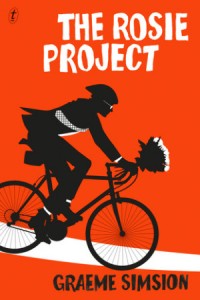 Title: The Rosie Project (Goodreads)
Title: The Rosie Project (Goodreads)
Author: Graeme Simsion
Published: Text, 2013
Pages: 329
Genres: Romance
My Copy: Library Book
Buy: Amazon, Book Depository (or visit your local Indie bookstore)
Don Tillman is a highly successful Professor of Genetics, but he is also a very socially awkward single man that believes the solution to all his problems is a wife. He embarks upon a search to find this wife; The Wife Project is a carefully designed questionnaire to find the perfect match for him. In comes Rosie, not a match, but Don finds himself helping her on search for her biological father.
Chick lit always seems to have a quirky woman looking for love, because apparently the message is that strong independent women are incomplete until they have a partner. That is probably a rant for another day but I have to wonder why Nick Hornsby and Graeme Simsion’s The Rosie Project does not fit into this genre? All the same characteristics are there, the only thing different is the role reversal. My wife jokingly calls the genre dick lit but I don’t know why there is a gender bias in a genre. I thought Seating Arrangements would be considered chick lit but because it had a male protagonist people dismiss it as something different. Not really important but I thought it odd that just because the main character is the wrong gender it doesn’t fall under the same category, which is one of the many problems with trying to categorise books into genres.
Now let’s get back to The Rosie Project; this was an entertaining and quick read that just has too many problems with it. This over hyped book’s major flaw is the portrayal of Asperger’s; much like Addition, a mental health issue (or in this case a pervasive developmental disorder) is the quirky personality. Because underplaying a mental health issue is the answer to making a character quirky; why can’t people just be quirky without having to point fingers? Misrepresenting mental health seems to be the go to move for writers of books, TV and movies and it really isn’t helping people understand these issues. Also while I’m on the topic, why does socially awkward, introverted or quirky have to be considered as problems, why can’t we just be happy for people to be different without having to stick a label on it?
The other major issue I had with The Rosie Project was its predictability; you knew exactly what was going to happen from chapter to chapter and how the book would end. There were no surprises, nothing interesting, just a generic plot. So we have an unpredictable, generic and stereotypical plot; does that leave you with any good points? Not really, just that it was entertaining and there was some decent comedy but in the end I was glad to be done with the book. Remember that old Jack Nicholson movie As Good As It Gets? I have to wonder if this is just a modernisation of that movie, there were so many similarities. I also found a lot of similarities to Addition so I’m not sure if there is anything original left in this book.
For those that don’t mind something so formulaic and predictable, this book is entertaining and you don’t really need to pay attention. I ended up skim reading most of this book and I still felt like I didn’t miss anything, because I guessed what would happen before I read it. I know this book has gotten a lot of buzz lately and I’m still that bitter and cynical old man but I really don’t get it; I don’t see what was so appealing.
Good on Graeme Simsion for taking the world by storm with this novel, the buzz in Australia has started to die down but now the hype is starting around the world. I see it was one of the books been heavily advertised at BEA from Australia (the other being Burial Rites). For that I’m glad it’s doing well, it is nice to see Australian books getting talked about all around the world. Much like The Book Thief, I don’t see why there is so much buzz but I’m still happy when an Australian author reaches the international stage. I’m sure there will be a romantic comedy coming from Hollywood soon, so maybe that is a good reason to read The Rosie Project.
